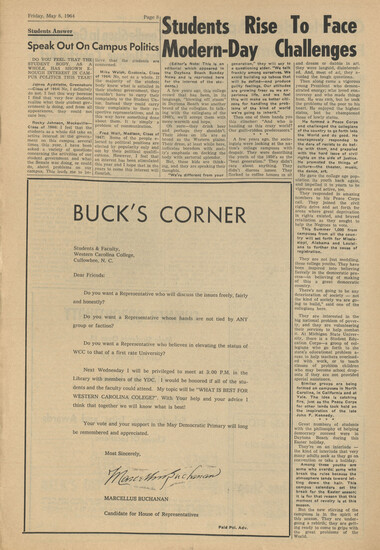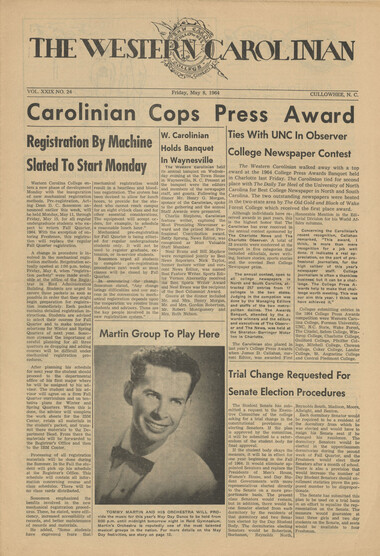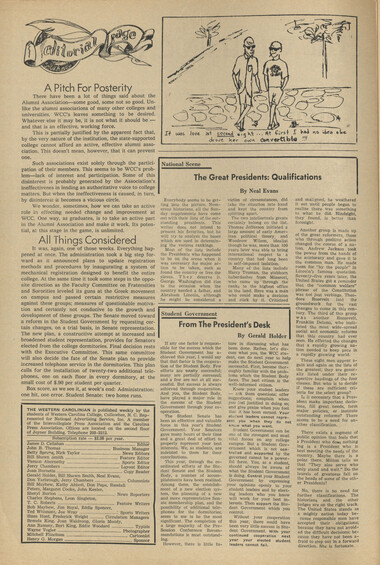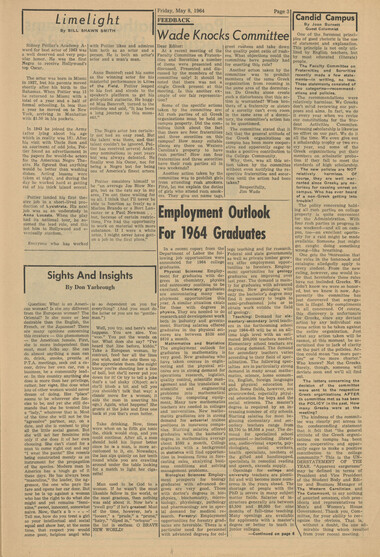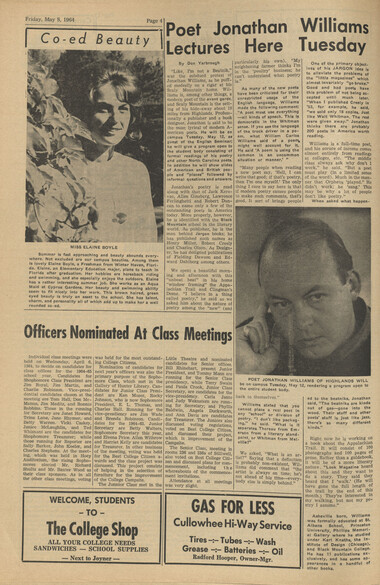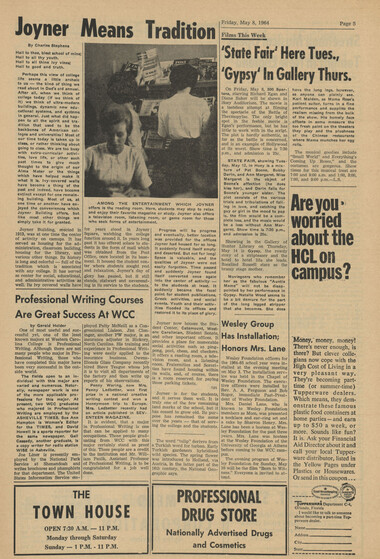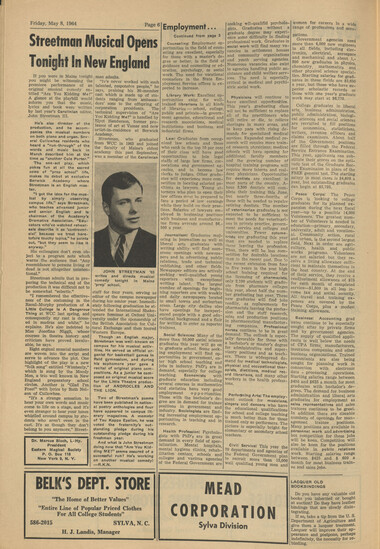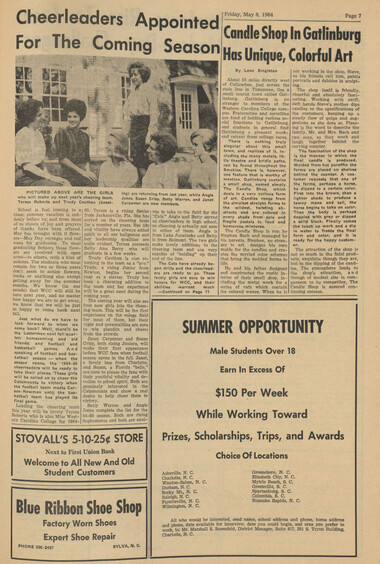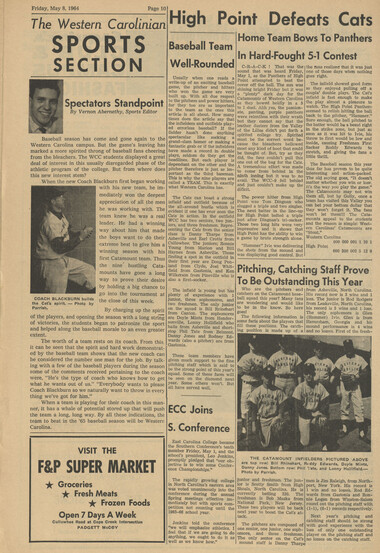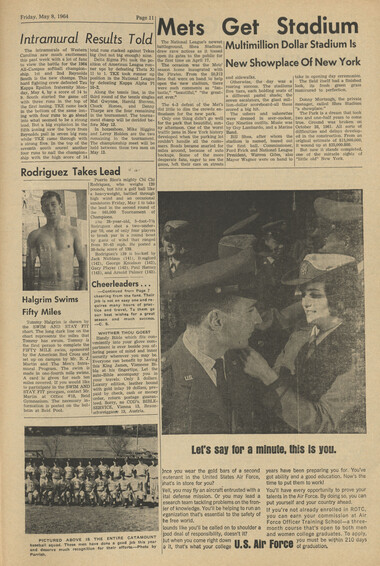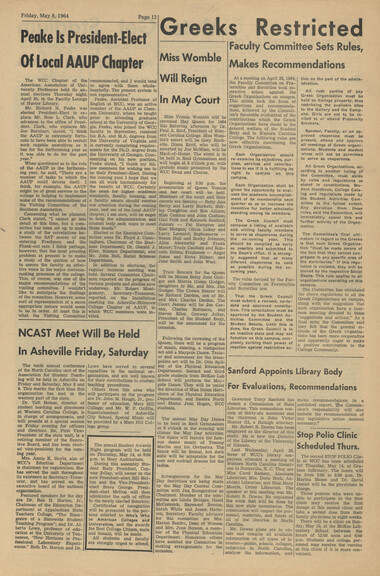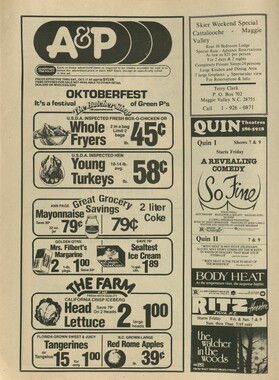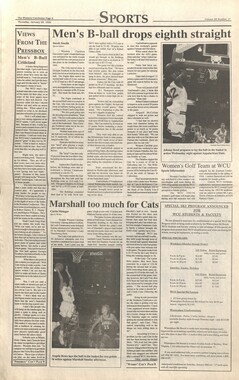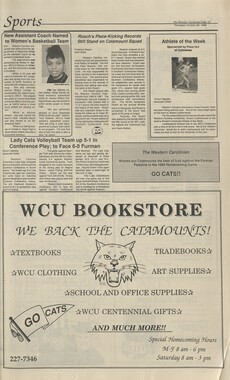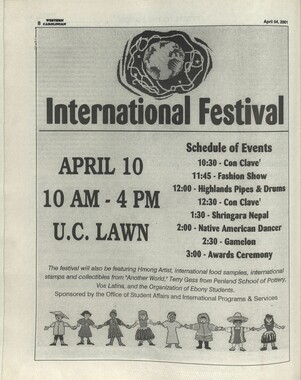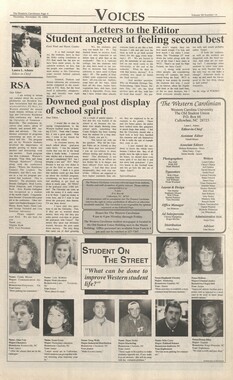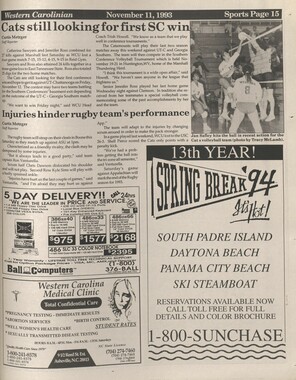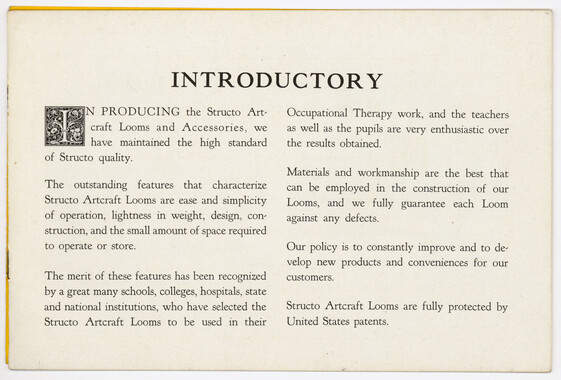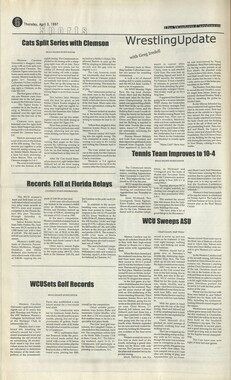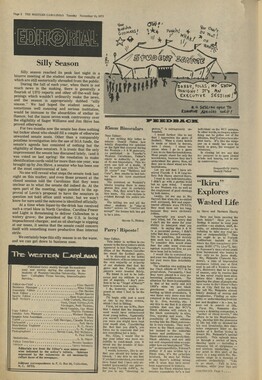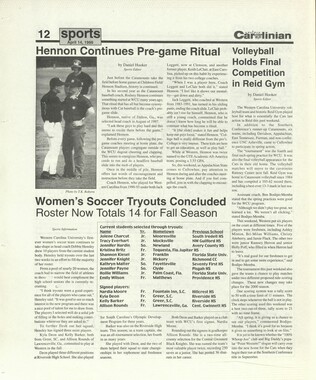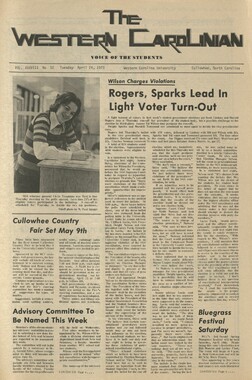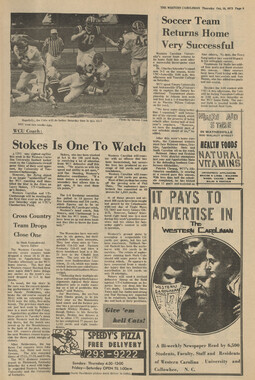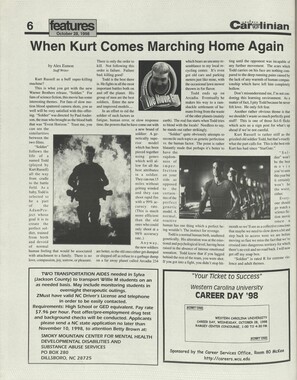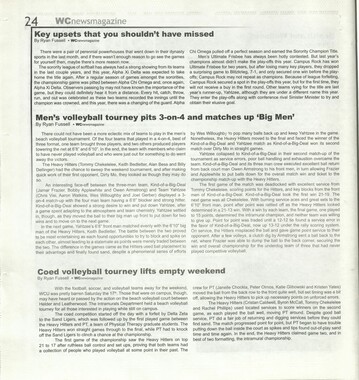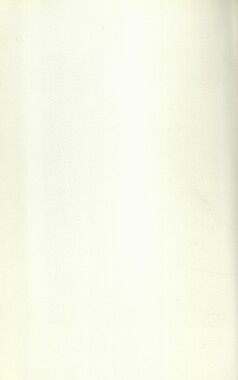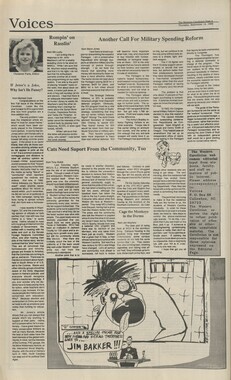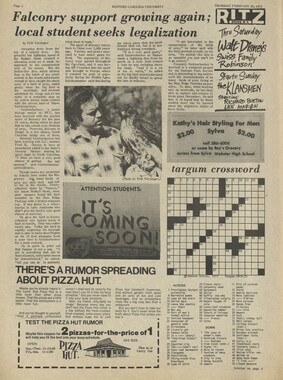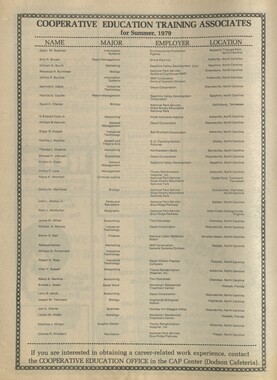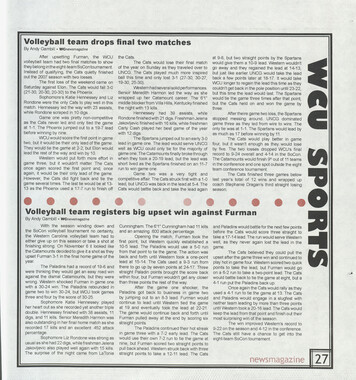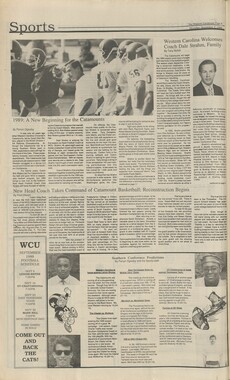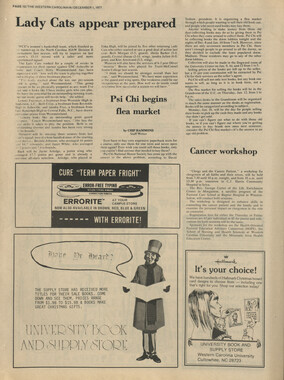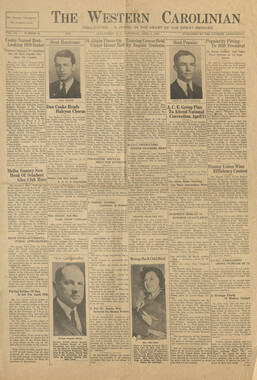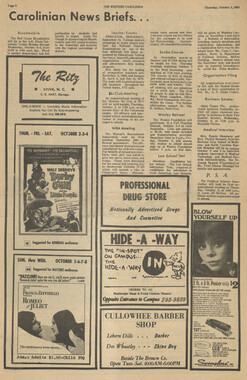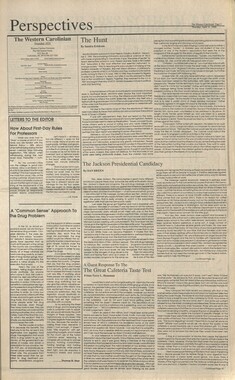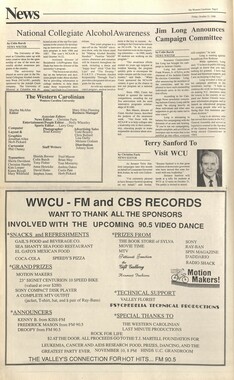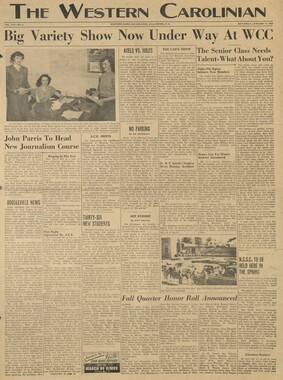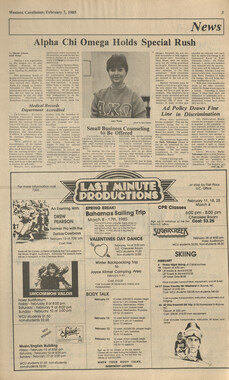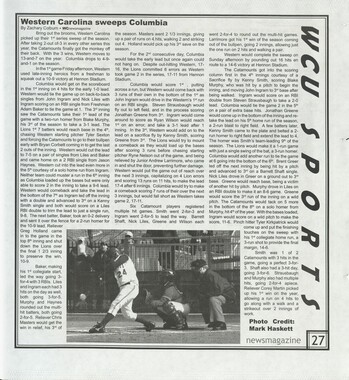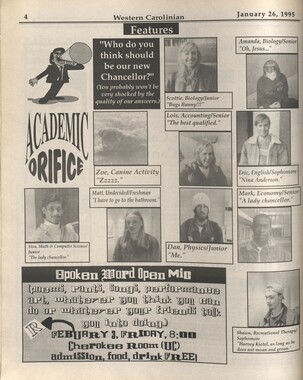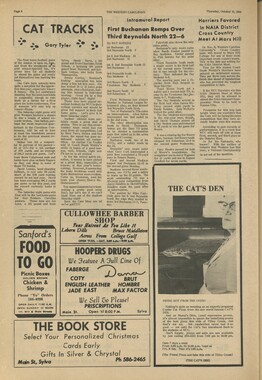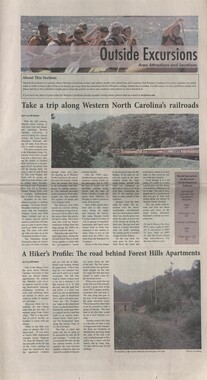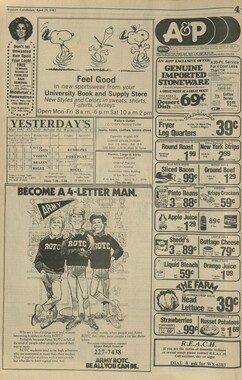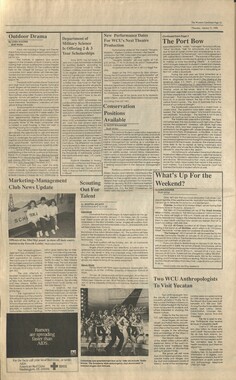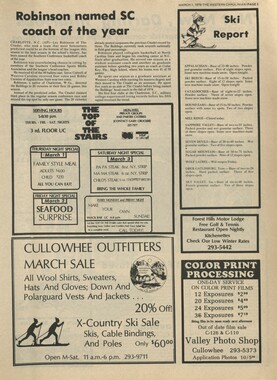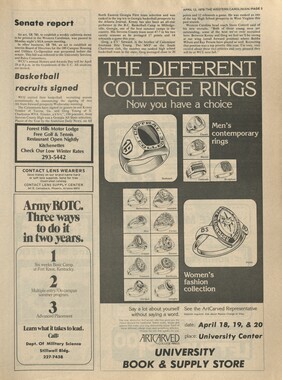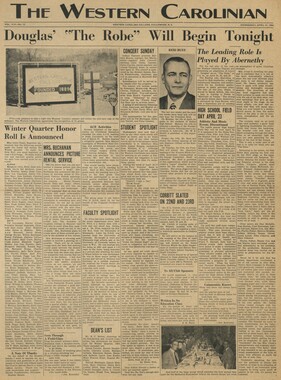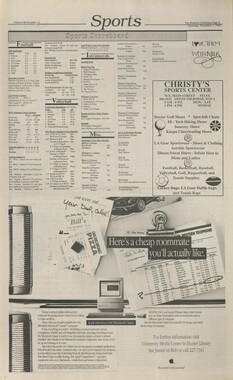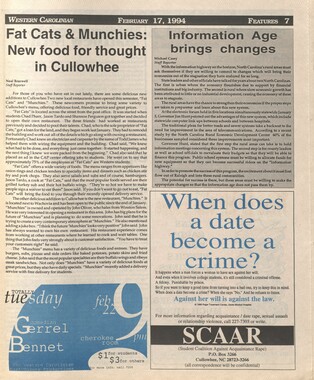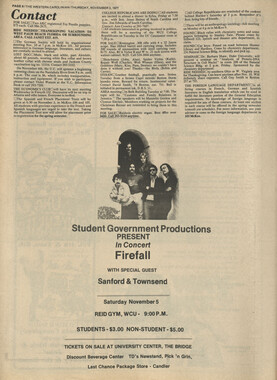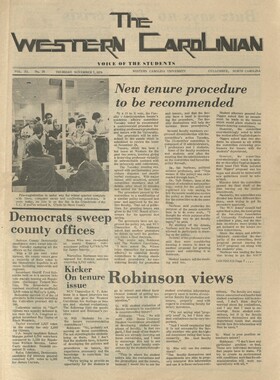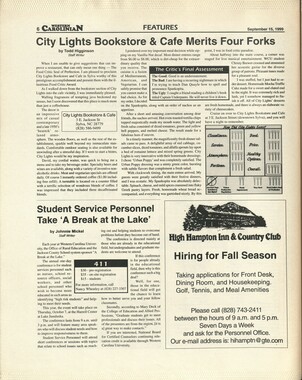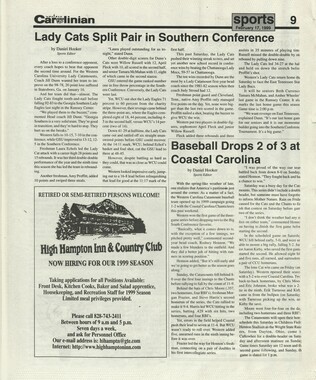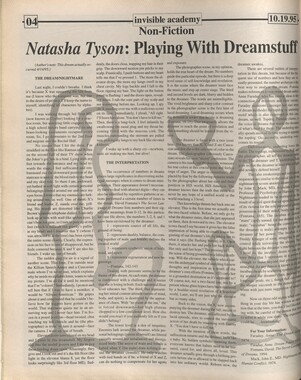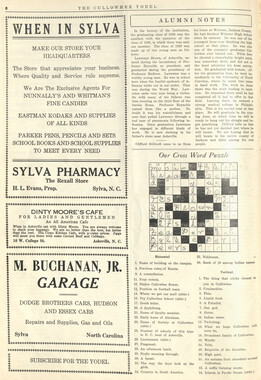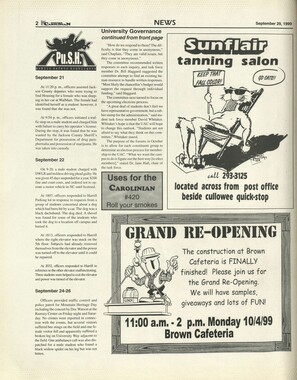Western Carolina University (21)
View all
- Canton Champion Fibre Company (2308)
- Cherokee Traditions (291)
- Civil War in Southern Appalachia (165)
- Craft Revival (1942)
- George Masa Collection (135)
- Great Smoky Mountains - A Park for America (2901)
- Highlights from Western Carolina University (422)
- Horace Kephart (941)
- Journeys Through Jackson (159)
- LGBTQIA+ Archive of Jackson County (85)
- Oral Histories of Western North Carolina (314)
- Picturing Appalachia (6798)
- Stories of Mountain Folk (413)
- Travel Western North Carolina (153)
- Western Carolina University Fine Art Museum Vitreograph Collection (129)
- Western Carolina University Herbarium (92)
- Western Carolina University: Making Memories (738)
- Western Carolina University Publications (2491)
- Western Carolina University Restricted Electronic Theses and Dissertations (146)
- Western North Carolina Regional Maps (71)
- World War II in Southern Appalachia (131)
University of North Carolina Asheville (6)
View all
- Allanstand Cottage Industries (62)
- Appalachian National Park Association (53)
- Bennett, Kelly, 1890-1974 (1463)
- Berry, Walter (76)
- Brasstown Carvers (40)
- Carver, George Washington, 1864?-1943 (26)
- Cathey, Joseph, 1803-1874 (1)
- Champion Fibre Company (233)
- Champion Paper and Fibre Company (297)
- Cherokee Indian Fair Association (16)
- Cherokee Language Program (22)
- Crowe, Amanda (40)
- Edmonston, Thomas Benton, 1842-1907 (7)
- Ensley, A. L. (Abraham Lincoln), 1865-1948 (275)
- Fromer, Irving Rhodes, 1913-1994 (70)
- George Butz (BFS 1907) (46)
- Goodrich, Frances Louisa (120)
- Grant, George Alexander, 1891-1964 (96)
- Heard, Marian Gladys (60)
- Kephart, Calvin, 1883-1969 (15)
- Kephart, Horace, 1862-1931 (313)
- Kephart, Laura, 1862-1954 (39)
- Laney, Gideon Thomas, 1889-1976 (439)
- Masa, George, 1881-1933 (61)
- McElhinney, William Julian, 1896-1953 (44)
- Niggli, Josephina, 1910-1983 (10)
- North Carolina Park Commission (105)
- Osborne, Kezia Stradley (9)
- Owens, Samuel Robert, 1918-1995 (11)
- Penland Weavers and Potters (36)
- Roberts, Vivienne (15)
- Roth, Albert, 1890-1974 (142)
- Schenck, Carl Alwin, 1868-1955 (1)
- Sherrill's Photography Studio (2565)
- Southern Highland Handicraft Guild (127)
- Southern Highlanders, Inc. (71)
- Stalcup, Jesse Bryson (46)
- Stearns, I. K. (213)
- Thompson, James Edward, 1880-1976 (226)
- United States. Indian Arts and Crafts Board (130)
- USFS (683)
- Vance, Zebulon Baird, 1830-1894 (1)
- Weaver, Zebulon, 1872-1948 (58)
- Western Carolina College (230)
- Western Carolina Teachers College (282)
- Western Carolina University (2008)
- Western Carolina University. Mountain Heritage Center (18)
- Whitman, Walt, 1819-1892 (10)
- Wilburn, Hiram Coleman, 1880-1967 (73)
- Williams, Isadora (3)
- Cain, Doreyl Ammons (0)
- Crittenden, Lorraine (0)
- Rhodes, Judy (0)
- Smith, Edward Clark (0)
- Appalachian Region, Southern (2693)
- Asheville (N.C.) (1936)
- Avery County (N.C.) (26)
- Blount County (Tenn.) (195)
- Buncombe County (N.C.) (1672)
- Cherokee County (N.C.) (283)
- Clay County (N.C.) (556)
- Graham County (N.C.) (236)
- Great Smoky Mountains National Park (N.C. and Tenn.) (519)
- Haywood County (N.C.) (3569)
- Henderson County (N.C.) (70)
- Jackson County (N.C.) (4913)
- Knox County (Tenn.) (35)
- Knoxville (Tenn.) (13)
- Lake Santeetlah (N.C.) (10)
- Macon County (N.C.) (420)
- Madison County (N.C.) (215)
- McDowell County (N.C.) (39)
- Mitchell County (N.C.) (132)
- Polk County (N.C.) (35)
- Qualla Boundary (982)
- Rutherford County (N.C.) (76)
- Swain County (N.C.) (2182)
- Transylvania County (N.C.) (270)
- Watauga County (N.C.) (12)
- Waynesville (N.C.) (86)
- Yancey County (N.C.) (72)
- Aerial Photographs (3)
- Aerial Views (60)
- Albums (books) (4)
- Articles (1)
- Artifacts (object Genre) (228)
- Bibliographies (1)
- Biography (general Genre) (2)
- Cards (information Artifacts) (38)
- Clippings (information Artifacts) (191)
- Copybooks (instructional Materials) (3)
- Crafts (art Genres) (622)
- Depictions (visual Works) (21)
- Design Drawings (1)
- Drawings (visual Works) (185)
- Envelopes (73)
- Exhibitions (events) (1)
- Facsimiles (reproductions) (1)
- Fiction (general Genre) (4)
- Financial Records (12)
- Fliers (printed Matter) (67)
- Glass Plate Negatives (381)
- Guidebooks (2)
- Internegatives (10)
- Interviews (815)
- Land Surveys (102)
- Letters (correspondence) (1013)
- Manuscripts (documents) (618)
- Maps (documents) (177)
- Memorandums (25)
- Minutes (administrative Records) (59)
- Negatives (photographs) (6090)
- Newsletters (1290)
- Newspapers (2)
- Notebooks (8)
- Occupation Currency (1)
- Paintings (visual Works) (1)
- Pen And Ink Drawings (1)
- Periodicals (193)
- Personal Narratives (10)
- Photographs (12976)
- Plans (maps) (1)
- Poetry (5)
- Portraits (4568)
- Postcards (329)
- Programs (documents) (181)
- Publications (documents) (2443)
- Questionnaires (65)
- Relief Prints (26)
- Sayings (literary Genre) (1)
- Scrapbooks (282)
- Sheet Music (2)
- Slides (photographs) (402)
- Songs (musical Compositions) (2)
- Sound Recordings (796)
- Specimens (92)
- Speeches (documents) (18)
- Tintypes (photographs) (8)
- Transcripts (322)
- Video Recordings (physical Artifacts) (23)
- Text Messages (0)
- A.L. Ensley Collection (275)
- Appalachian Industrial School Records (7)
- Appalachian National Park Association Records (336)
- Axley-Meroney Collection (2)
- Bayard Wootten Photograph Collection (20)
- Bethel Rural Community Organization Collection (7)
- Blumer Collection (5)
- C.W. Slagle Collection (20)
- Canton Area Historical Museum (2110)
- Carlos C. Campbell Collection (462)
- Cataloochee History Project (64)
- Cherokee Studies Collection (4)
- Daisy Dame Photograph Album (5)
- Daniel Boone VI Collection (1)
- Doris Ulmann Photograph Collection (112)
- Elizabeth H. Lasley Collection (1)
- Elizabeth Woolworth Szold Fleharty Collection (4)
- Frank Fry Collection (95)
- George Masa Collection (173)
- Gideon Laney Collection (452)
- Hazel Scarborough Collection (2)
- Hiram C. Wilburn Papers (28)
- Historic Photographs Collection (236)
- Horace Kephart Collection (861)
- Humbard Collection (33)
- Hunter and Weaver Families Collection (1)
- I. D. Blumenthal Collection (4)
- Isadora Williams Collection (4)
- Jesse Bryson Stalcup Collection (47)
- Jim Thompson Collection (224)
- John B. Battle Collection (7)
- John C. Campbell Folk School Records (80)
- John Parris Collection (6)
- Judaculla Rock project (2)
- Kelly Bennett Collection (1482)
- Love Family Papers (11)
- Major Wiley Parris Civil War Letters (3)
- Map Collection (12)
- McFee-Misemer Civil War Letters (34)
- Mountain Heritage Center Collection (4)
- Norburn - Robertson - Thomson Families Collection (44)
- Pauline Hood Collection (7)
- Pre-Guild Collection (2)
- Qualla Arts and Crafts Mutual Collection (12)
- R.A. Romanes Collection (681)
- Rosser H. Taylor Collection (1)
- Samuel Robert Owens Collection (94)
- Sara Madison Collection (144)
- Sherrill Studio Photo Collection (2558)
- Smoky Mountains Hiking Club Collection (616)
- Stories of Mountain Folk - Radio Programs (374)
- The Reporter, Western Carolina University (510)
- Venoy and Elizabeth Reed Collection (16)
- WCU Gender and Sexuality Oral History Project (32)
- WCU Mountain Heritage Center Oral Histories (25)
- WCU Oral History Collection - Mountain People, Mountain Lives (71)
- WCU Students Newspapers Collection (1923)
- Western North Carolina Tomorrow Black Oral History Project (69)
- William Williams Stringfield Collection (2)
- Zebulon Weaver Collection (109)
- African Americans (390)
- Appalachian Trail (35)
- Artisans (521)
- Cherokee art (84)
- Cherokee artists -- North Carolina (10)
- Cherokee language (21)
- Cherokee pottery (101)
- Cherokee women (208)
- Church buildings (190)
- Civilian Conservation Corps (U.S.) (111)
- College student newspapers and periodicals (2012)
- Dams (107)
- Dance (1023)
- Education (222)
- Floods (61)
- Folk music (1015)
- Forced removal, 1813-1903 (2)
- Forest conservation (220)
- Forests and forestry (1195)
- Gender nonconformity (4)
- Great Smoky Mountains National Park (N.C. and Tenn.) (181)
- Hunting (45)
- Landscape photography (25)
- Logging (119)
- Maps (83)
- Mines and mineral resources (8)
- North Carolina -- Maps (18)
- Paper industry (38)
- Postcards (255)
- Pottery (135)
- Railroad trains (72)
- Rural electrification -- North Carolina, Western (3)
- School integration -- Southern States (2)
- Segregation -- North Carolina, Western (5)
- Slavery (5)
- Sports (452)
- Storytelling (243)
- Waterfalls -- Great Smoky Mountains (N.C. and Tenn.) (66)
- Weaving -- Appalachian Region, Southern (280)
- Wood-carving -- Appalachian Region, Southern (328)
- World War, 1939-1945 (173)
Western Carolinian Volume 29 Number 24
Item
Item’s are ‘child’ level descriptions to ‘parent’ objects, (e.g. one page of a whole book).
-
-
Friday, May 8, 1964 Page 8 Students Answer Speak Out On Campus Politics DO YOU FEEL THAT THE STUDENT BODY, AS A WHOLE, HAS SHOWN E- NOUGH INTEREST IN CAMPUS POLITICS THIS YEAR? James Aydelette, Greensboro —Class of 1964: No, I definitely do not. I feel this way because I find that very few students realize what their student government is doing, and from all appearances, they could not care less. Rocky Johnson, Mocksville— Class of 1966: I feel that the students as a whole did take an active interest in the government on this campus several times this year. I have been asked a variety of questions concerning the activities of our student government and what the Senate was doing, or could do, about problems on our campus. This leads me to be- Ui vi' that the students are concerned. Mike Walsh, Gastonia, Class of 1964: No, not as a whole. If the majority of the student body knew what is entailed in their student government, they wouldn't have to carry their complaints to the Student Union. Instead they could carry their complaints to their respective representatives, and in this way have something done about them. It is simply a problem of communication. Fred Wall, Madison, Class of 1967: Some of the people e- lected to political positions are elected by popularity only and not by their political qualifications. However, I feel that an interest has been stimulated this year and I hope that in the years to come this interest will flourish. Students Rise To Face Modern-Day Challenges (Editor's Note: This is an editorial which appeared in the Daytona Beach Sunday News and is reprinted here for the interest of the students.) A few years ago, this college crowd that has been, in its language, "blowing off steam" in Daytona Beach was another breed of the collegian. In talking with the collegians of the 1960's, we'll accept them with more warmth and hope. Oh sure—they drink beer and perhaps they shouldn't. Their ideas on life are as broad as the Western plains. Their dress, at least while here, indicates boredom with soci- ty's emphasis on decking the body with sartorial splendor. But, these kids are thinking, and they are speaking their thoughts. "We're different from your generation," they will say to a questioning elder. "We talk frankly among ourselves. We avoid building up taboos that will be defied—and produce guilty feelings. Our attitudes are growing freer as we experience life, and we feel this will make us better citizens for handling the problems of the kind of world we're going to inherit." Then one of them hands you this clincher: "And who is handing us this crazy world? Our guilt-ridden predecessors." * * * A few years ago, the sociologists were looking at the nation's college campuses with despair. They were describing the youth of the 1950's as the "beat generation." They didn't care about anything. They didn't discuss issues. They flocked to coffee houses to sit BUCK'S CORNER Students & Faculty, Western Carolina College, Cullowhee, N. C. Dear Friends: Do you want a Representative who will discuss the issues freely, fairly and honestly? Do you want a Representative whose hands are not tied by ANY group or faction? Do you want a Representative who believes in elevating the status of WCC to that of a first rate University? Next Wednesday I will be privileged to meet at 3:00 P.M. in the Library with members of the YDC. I would be honored if all of the students and the faculty could attend. My topic will be "WHAT IS BEST FOR WESTERN CAROLINA COLEGE?". With Your help and your advice I think that together we will know what is best! Your vote and your support in the May Democratic Primary will long be remembered and appreciated. Most Sincerely, MARCELLUS BUCHANAN Candidate for House of Representatives Paid Pol. Adv. and dream or dabble in art. they were languid, disinterested. And, most of ail, they a- voided the tough questions. Then along came a vigorous young President who demonstrated energy; who loved controversy and who made things hum. He was rrch, but he took the problems of the poor to his heart. He enjoyed the highest status, but he championed those of lowly status. He formed a Peace Corps and challenged the collegians of the country to go forth into the World and do good. He courageously responded to the dare of racists to do battle with them, and grappled with the hard issue of civil rights on the side o'f justice. He promoted the things of culture—the theater, music, the dance, art. He gave the college age population its youth back again, and impelled it to yearn to be vigorous and active, too. They responded in amazing numbers to his Peace Corps call. They joined the civil rights drive and set forth for areas where great deprivation in rights existed, and braved retaliation as they sought to help the Negroes to vote. This Summer 1,000 from campuses from all the country will set forth for Mississippi, Alabama and Louisiana to further the cause of registration. They are not just meddling, these college youths. They have been inspired into believing fiercely in the democratic process—in believing of making of this a great democratic country. There's not going to be any deterioration of society — not the kind of society we are going to build," said one of the collegians here. They are interested in the big national problem of poverty, and they are volunteering their services to help combat it. At Michigan State University, there is a Student Education Corps—a group of collegians who go forth to the state's educational problem a- reas to help teachers overloaded with work, or to teach classes of problem children who may become school dropouts if they are not provided special assistance. Similar groups are being formed on campuses in North Carolina, In California and at Yale. The Idea is catching fire, just as the Peace Corps for other lands took hold on the inspiration of the late John F. Kennedy. * * * Great numbers of students with the philosophy of helping democracy succeed were in Daytona Beach during this Easter holiday. They're on an interlude — the kind of interlude that very many adults seek as they go on convention or take a holiday. Among these youths are some who overdo; some who break the rules because the atmosphere tends toward letting down the hair. This campus calendars set the break for the Easter season; it is for that reason that this moment of revelry is at this season. But the new stirring of the campuses is in the spirit of this season. They are undergoing a rebirth; they are getting ready to come to grips with the great problems of the World.
Object
Object’s are ‘parent’ level descriptions to ‘children’ items, (e.g. a book with pages).
-
The Western Carolinian is Western Carolina University’s student-run newspaper. The paper was published as the Cullowhee Yodel from 1924 to 1931 before changing its name to The Western Carolinian in 1933.
-
